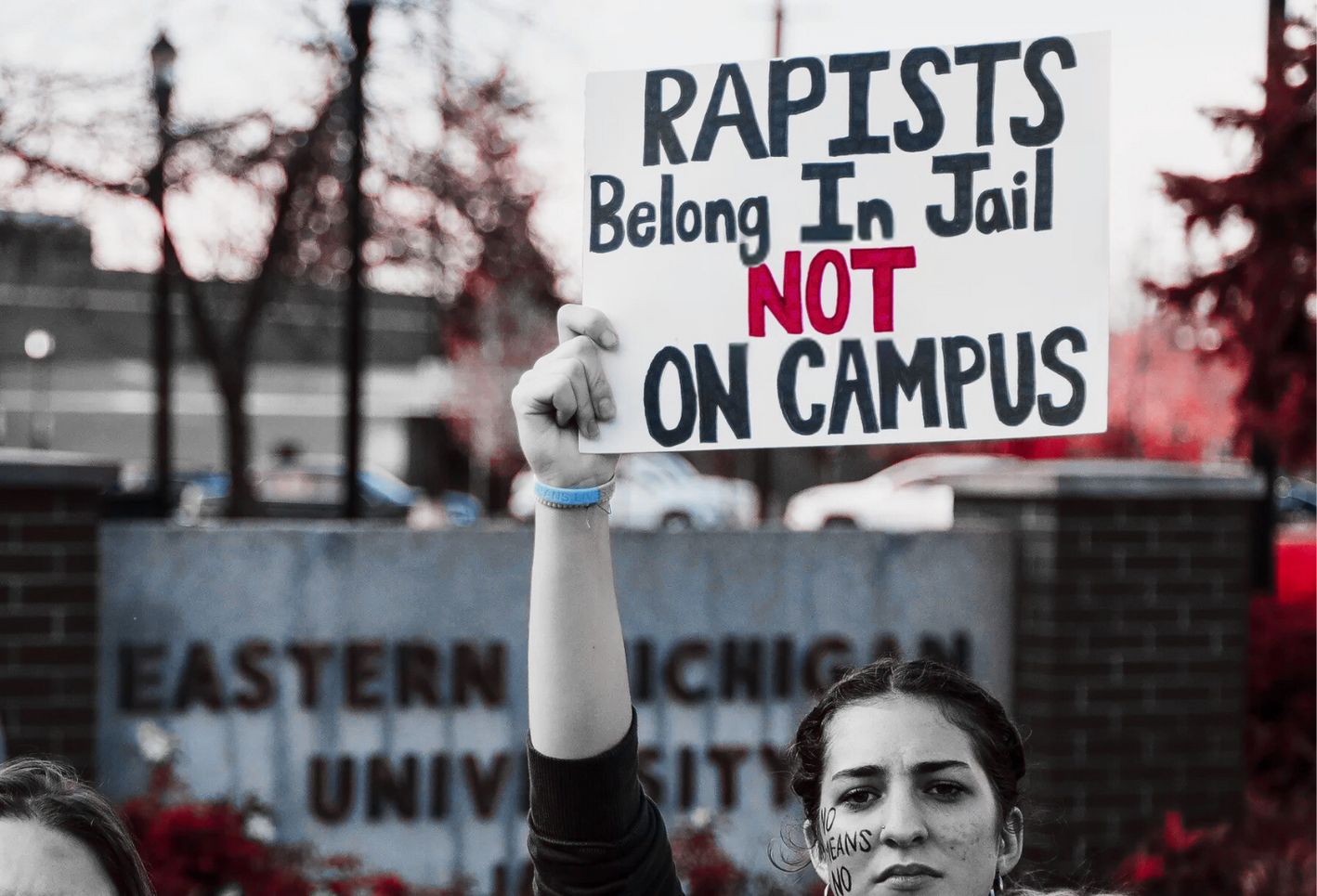Blog Posts

Sending your daughter off to college is one of the proudest moments of parenthood. You have watched her grow, guided her through challenges, and helped her become independent. Now she is stepping into a world of freedom, new experiences, and adulthood. But for many parents, this milestone comes with an undercurrent of worry. You are not just thinking about tuition or textbooks. You are wondering if she will be safe . The reality is that college campuses, while full of opportunity, are also places where young women face increased risk. Sexual assault, harassment, manipulation, and pressure are unfortunately part of the world many students walk into. Nearly one in four undergraduate women in the United States experience sexual assault before graduation . Many never report it. And many never feel safe again. As a parent, your role does not end when you drop her off at school. You can still be a guiding voice. You can still help prepare her not just for academic success, but for personal safety and empowerment. What to Teach, What to Say, What to Give Start with trust and openness. Your daughter is more likely to come to you if she knows you will listen without judgment. Talk early and often about the realities of boundaries, consent, and healthy relationships. Make it clear that her safety is never something she should feel ashamed to prioritize. Let her know that her instincts matter. That if she feels uncomfortable, she does not need to explain why to anyone. Discuss common situations she might face. This could include walking home at night, feeling pressure at a party, or navigating unwanted attention from someone she knows. Help her understand that it is okay to leave any situation, no matter what. Give her permission to protect her peace. Role-play possible scenarios if she is open to it. Talk through ways she might respond. Help her build a support system. Encourage her to connect with trusted friends, mentors, or campus staff. Make sure she knows where the campus counseling center is and what local resources are available. You can also look into community-based support like RAINN, Love is Respect, or the National Sexual Assault Hotline. Equip her with tools that go beyond advice. Words matter, but so do actions. One way to show you care is by giving her a safety device she can use if something ever feels wrong. That is where Amulet SafeTech comes in. Our discreet safety necklace is designed specifically for women who want protection without needing to pull out their phone or make a scene. With the press of a hidden button, she can send an alert to chosen contacts, trigger a fake phone call, record video or audio, and more. It works seamlessly with our mobile app to give her quiet confidence wherever she is. Amulet does not replace your love, your guidance, or your presence. But it gives her one more layer of support when she needs it most. Practical Tips for Parents of College-Bound Daughters Have a conversation about digital safety. Talk about sharing locations with friends, being mindful of what she posts, and setting strong boundaries online and in person. Encourage her to take self defense or personal safety workshops. Many universities and local centers offer these for free. Make sure she has key phone numbers saved. This includes campus police, local emergency services, a few trusted contacts, and crisis hotlines. Talk about alcohol, consent, and peer pressure. Let her know that nothing ever gives someone the right to cross her boundaries. Teach her that asking for help is a strength, not a weakness. Whether it is calling a friend, going to counseling, or reporting an incident, she deserves support. Consider small gifts that show support. A journal, a cozy throw, noise cancelling headphones, a self care kit, or an Amulet safety necklace all send the same message: I care about your safety, your comfort, and your confidence. Let her know that home is still her safety net. That no matter how far away she is, she is not alone. That even when she is becoming her own person, you are still here to support her in every way that matters. College should be exciting, enriching, and empowering. It should not be a place where young women are forced to shrink themselves to stay safe. And while you cannot always be by her side, you can give her the tools, the conversations, and the reminders that she deserves to feel protected and powerful. - Amulet SafeTech

College is supposed to be a fresh start. A place to grow. A place to explore and build a life full of new experiences. But for far too many young women, it becomes the setting of their deepest trauma. Sexual assault on college campuses is not rare. It is not an unfortunate exception. It is a quiet and persistent epidemic that we still do not talk about enough. According to the Association of American Universities, more than one in four undergraduate women will experience sexual assault during their time in college. That number is even higher for LGBTQ+ students. Nearly half will face some form of sexual misconduct. Most of these assaults happen during the first few months of freshman year. This period is often called the Red Zone. Yet despite how common this is, more than ninety percent of these incidents are never reported. When Silence Feels Safer Than Speaking As a college student, I have seen this unfold too many times. I know girls who were raped during their freshman year. Some in dorms. Some after parties. Some by people they trusted. And I have seen them sit in class months later with their attacker just a few seats away. No punishment. No accountability. No support. Reporting is not easy. Survivors often fear they will not be believed. Sometimes their attacker is someone they know. A classmate. A friend. Even someone admired on campus. They worry about being blamed or shamed. About having to relive every detail in front of people who may question their story. About being asked what they wore. If they had been drinking. Whether they led him on. The burden of proof falls on someone already carrying the weight of trauma. Many schools do not make it any easier. Survivors are often discouraged from filing official reports. The Title IX process, which is meant to protect students, is often confusing and traumatic. Nearly half of college students say the reporting process is unclear or makes them feel unsafe. Some schools underreport assault data. Others quietly pressure students not to file complaints. And when someone does report, there is rarely justice. Only about one percent of rapists are ever convicted and sent to prison. When students see that nothing will happen, or that things might even get worse for them, silence starts to feel like the safer option. We Deserve More Than Warnings and Worry This is not just about one night. Or one person. Or one incident. Sexual assault can change the entire course of a student’s life. Academic performance drops. Some students withdraw from classes. Some transfer. Some drop out completely. The emotional impact can last for years. Survivors face depression. Anxiety. Post traumatic stress. And they often do it alone while trying to keep up a normal college routine. So what can we do? We can start by listening. By believing. By refusing to downplay or excuse the violence. We can build a world where women do not have to choose between silence and survival. At Amulet SafeTech , we believe that safety should not be something you wish for. It should be something you can count on. Our safety necklace and mobile app were created to give women more control in moments when it feels like everything is slipping away. Whether you are walking home, attending a party, or sitting in a room where something feels wrong, you deserve to have a tool that helps you feel safe and in control. You should not have to wait until something happens. You should not have to explain your fear. You should not have to prove your instincts are right. To every woman walking across campus. To every freshman finding her way. To every survivor who has never told a soul. You are not alone. You are not to blame. And we are building this for you. - Amulet SafeTech

When Margaret Atwood first published The Handmaid’s Tale in 1985, it was a dystopian novel meant to serve as a warning—not a prophecy. Set in the theocratic, totalitarian society of Gilead, where women’s rights are stripped away and female bodies are reduced to vessels of reproduction, the novel painted a chilling picture of what could happen if the erosion of freedoms goes unchecked. Atwood has famously said she included nothing in the book that had not already happened somewhere in real life. Decades later, it feels less like a hypothetical and more like a mirror. A Story That Echoes Reality The most haunting part of The Handmaid’s Tale is not the red cloaks or the silent marches. It’s the slow unraveling. Rights are not taken all at once—they are peeled away, piece by piece, until women no longer recognize the world they live in. Today, we are watching that same pattern in real time. Across the globe, reproductive rights are being challenged or outright revoked. In some places, victims of sexual violence face more scrutiny than their attackers. The language of “protecting tradition” or “preserving family values” is increasingly used to justify legislation that chips away at gender equality and bodily autonomy. It is not a fictional regime that forces us to keep our heads down and our voices quiet. It is real systems, real people, and real policies. The Silencing of Women’s Voices In The Handmaid’s Tale, silence is not just a condition—it is a weapon. The women of Gilead are forbidden from reading, writing, or speaking freely. Their stories are suppressed. Their pain is ignored. And while most of us are not living in a society that literally outlaws female speech, we still see the consequences of silence. Survivors of harassment and assault are still doubted, blamed, and dismissed. Women are told they are overreacting. That they are imagining things. That they should smile more. Be nicer. Be quieter. Silence is not just a lack of voice—it is often a survival tactic. One many women still rely on every single day. Resisting the Slide Toward Normalization What The Handmaid’s Tale shows us is how fast injustice can become normalized. What once felt shocking becomes expected. Outrage fades into exhaustion. And before long, people stop fighting back—not because they agree, but because they feel powerless. That is why it is so important to notice the warning signs. To call out the systems that dehumanize. To listen to the people who are already being impacted. And to keep resisting the idea that any of this is “just the way things are.” Why This Story Still Matters It is easy to think of dystopian fiction as exaggeration. But The Handmaid’s Tale is not just a story about some far-off world. It is about ours. And it reminds us of the consequences of silence, the dangers of apathy, and the power of awareness. It reminds us that every right we have was once fought for. And that it can be taken away just as easily if we are not paying attention. At Amulet SafeTech , we believe in a future where women are empowered—not controlled. Where safety is not a privilege, but a basic right. And where every woman has the tools and support she needs to speak up, stand tall, and live freely. Because we’ve read The Handmaid’s Tale. And we refuse to live it. - Amulet SafeTech Team

Sending your daughter off to college is one of the proudest moments of parenthood. You have watched her grow, guided her through challenges, and helped her become independent. Now she is stepping into a world of freedom, new experiences, and adulthood. But for many parents, this milestone comes with an undercurrent of worry. You are not just thinking about tuition or textbooks. You are wondering if she will be safe . The reality is that college campuses, while full of opportunity, are also places where young women face increased risk. Sexual assault, harassment, manipulation, and pressure are unfortunately part of the world many students walk into. Nearly one in four undergraduate women in the United States experience sexual assault before graduation . Many never report it. And many never feel safe again. As a parent, your role does not end when you drop her off at school. You can still be a guiding voice. You can still help prepare her not just for academic success, but for personal safety and empowerment. What to Teach, What to Say, What to Give Start with trust and openness. Your daughter is more likely to come to you if she knows you will listen without judgment. Talk early and often about the realities of boundaries, consent, and healthy relationships. Make it clear that her safety is never something she should feel ashamed to prioritize. Let her know that her instincts matter. That if she feels uncomfortable, she does not need to explain why to anyone. Discuss common situations she might face. This could include walking home at night, feeling pressure at a party, or navigating unwanted attention from someone she knows. Help her understand that it is okay to leave any situation, no matter what. Give her permission to protect her peace. Role-play possible scenarios if she is open to it. Talk through ways she might respond. Help her build a support system. Encourage her to connect with trusted friends, mentors, or campus staff. Make sure she knows where the campus counseling center is and what local resources are available. You can also look into community-based support like RAINN, Love is Respect, or the National Sexual Assault Hotline. Equip her with tools that go beyond advice. Words matter, but so do actions. One way to show you care is by giving her a safety device she can use if something ever feels wrong. That is where Amulet SafeTech comes in. Our discreet safety necklace is designed specifically for women who want protection without needing to pull out their phone or make a scene. With the press of a hidden button, she can send an alert to chosen contacts, trigger a fake phone call, record video or audio, and more. It works seamlessly with our mobile app to give her quiet confidence wherever she is. Amulet does not replace your love, your guidance, or your presence. But it gives her one more layer of support when she needs it most. Practical Tips for Parents of College-Bound Daughters Have a conversation about digital safety. Talk about sharing locations with friends, being mindful of what she posts, and setting strong boundaries online and in person. Encourage her to take self defense or personal safety workshops. Many universities and local centers offer these for free. Make sure she has key phone numbers saved. This includes campus police, local emergency services, a few trusted contacts, and crisis hotlines. Talk about alcohol, consent, and peer pressure. Let her know that nothing ever gives someone the right to cross her boundaries. Teach her that asking for help is a strength, not a weakness. Whether it is calling a friend, going to counseling, or reporting an incident, she deserves support. Consider small gifts that show support. A journal, a cozy throw, noise cancelling headphones, a self care kit, or an Amulet safety necklace all send the same message: I care about your safety, your comfort, and your confidence. Let her know that home is still her safety net. That no matter how far away she is, she is not alone. That even when she is becoming her own person, you are still here to support her in every way that matters. College should be exciting, enriching, and empowering. It should not be a place where young women are forced to shrink themselves to stay safe. And while you cannot always be by her side, you can give her the tools, the conversations, and the reminders that she deserves to feel protected and powerful. - Amulet SafeTech

College is supposed to be a fresh start. A place to grow. A place to explore and build a life full of new experiences. But for far too many young women, it becomes the setting of their deepest trauma. Sexual assault on college campuses is not rare. It is not an unfortunate exception. It is a quiet and persistent epidemic that we still do not talk about enough. According to the Association of American Universities, more than one in four undergraduate women will experience sexual assault during their time in college. That number is even higher for LGBTQ+ students. Nearly half will face some form of sexual misconduct. Most of these assaults happen during the first few months of freshman year. This period is often called the Red Zone. Yet despite how common this is, more than ninety percent of these incidents are never reported. When Silence Feels Safer Than Speaking As a college student, I have seen this unfold too many times. I know girls who were raped during their freshman year. Some in dorms. Some after parties. Some by people they trusted. And I have seen them sit in class months later with their attacker just a few seats away. No punishment. No accountability. No support. Reporting is not easy. Survivors often fear they will not be believed. Sometimes their attacker is someone they know. A classmate. A friend. Even someone admired on campus. They worry about being blamed or shamed. About having to relive every detail in front of people who may question their story. About being asked what they wore. If they had been drinking. Whether they led him on. The burden of proof falls on someone already carrying the weight of trauma. Many schools do not make it any easier. Survivors are often discouraged from filing official reports. The Title IX process, which is meant to protect students, is often confusing and traumatic. Nearly half of college students say the reporting process is unclear or makes them feel unsafe. Some schools underreport assault data. Others quietly pressure students not to file complaints. And when someone does report, there is rarely justice. Only about one percent of rapists are ever convicted and sent to prison. When students see that nothing will happen, or that things might even get worse for them, silence starts to feel like the safer option. We Deserve More Than Warnings and Worry This is not just about one night. Or one person. Or one incident. Sexual assault can change the entire course of a student’s life. Academic performance drops. Some students withdraw from classes. Some transfer. Some drop out completely. The emotional impact can last for years. Survivors face depression. Anxiety. Post traumatic stress. And they often do it alone while trying to keep up a normal college routine. So what can we do? We can start by listening. By believing. By refusing to downplay or excuse the violence. We can build a world where women do not have to choose between silence and survival. At Amulet SafeTech , we believe that safety should not be something you wish for. It should be something you can count on. Our safety necklace and mobile app were created to give women more control in moments when it feels like everything is slipping away. Whether you are walking home, attending a party, or sitting in a room where something feels wrong, you deserve to have a tool that helps you feel safe and in control. You should not have to wait until something happens. You should not have to explain your fear. You should not have to prove your instincts are right. To every woman walking across campus. To every freshman finding her way. To every survivor who has never told a soul. You are not alone. You are not to blame. And we are building this for you. - Amulet SafeTech

When Margaret Atwood first published The Handmaid’s Tale in 1985, it was a dystopian novel meant to serve as a warning—not a prophecy. Set in the theocratic, totalitarian society of Gilead, where women’s rights are stripped away and female bodies are reduced to vessels of reproduction, the novel painted a chilling picture of what could happen if the erosion of freedoms goes unchecked. Atwood has famously said she included nothing in the book that had not already happened somewhere in real life. Decades later, it feels less like a hypothetical and more like a mirror. A Story That Echoes Reality The most haunting part of The Handmaid’s Tale is not the red cloaks or the silent marches. It’s the slow unraveling. Rights are not taken all at once—they are peeled away, piece by piece, until women no longer recognize the world they live in. Today, we are watching that same pattern in real time. Across the globe, reproductive rights are being challenged or outright revoked. In some places, victims of sexual violence face more scrutiny than their attackers. The language of “protecting tradition” or “preserving family values” is increasingly used to justify legislation that chips away at gender equality and bodily autonomy. It is not a fictional regime that forces us to keep our heads down and our voices quiet. It is real systems, real people, and real policies. The Silencing of Women’s Voices In The Handmaid’s Tale, silence is not just a condition—it is a weapon. The women of Gilead are forbidden from reading, writing, or speaking freely. Their stories are suppressed. Their pain is ignored. And while most of us are not living in a society that literally outlaws female speech, we still see the consequences of silence. Survivors of harassment and assault are still doubted, blamed, and dismissed. Women are told they are overreacting. That they are imagining things. That they should smile more. Be nicer. Be quieter. Silence is not just a lack of voice—it is often a survival tactic. One many women still rely on every single day. Resisting the Slide Toward Normalization What The Handmaid’s Tale shows us is how fast injustice can become normalized. What once felt shocking becomes expected. Outrage fades into exhaustion. And before long, people stop fighting back—not because they agree, but because they feel powerless. That is why it is so important to notice the warning signs. To call out the systems that dehumanize. To listen to the people who are already being impacted. And to keep resisting the idea that any of this is “just the way things are.” Why This Story Still Matters It is easy to think of dystopian fiction as exaggeration. But The Handmaid’s Tale is not just a story about some far-off world. It is about ours. And it reminds us of the consequences of silence, the dangers of apathy, and the power of awareness. It reminds us that every right we have was once fought for. And that it can be taken away just as easily if we are not paying attention. At Amulet SafeTech , we believe in a future where women are empowered—not controlled. Where safety is not a privilege, but a basic right. And where every woman has the tools and support she needs to speak up, stand tall, and live freely. Because we’ve read The Handmaid’s Tale. And we refuse to live it. - Amulet SafeTech Team

Why We Do Not Always Report: The Emotional Toll of Sexual Violence They ask, “Why did you not go to the police?” “Why did you not tell anyone?” “Why did you not fight back?” As if the silence was the problem. As if the blame belongs to the person who survived, not the one who caused the harm. Every time a woman shares her story of assault—whether it is to a friend, a therapist, or the internet—she risks being met with doubt, shame, or even outright hostility. So often, we choose silence not because we want to, but because it feels safer than speaking. And that silence is heavy. The Reality: Most Survivors Do Not Report According to RAINN, more than 75 percent of sexual assaults are never reported. For women under the age of 24, that number is even higher. Reporting is not just a step toward justice—it can be a traumatic, uphill battle that survivors may not feel ready, supported, or safe enough to face. Why do we stay silent? Because of shame. Society often teaches women to internalize assault as their fault. We are asked, “What were you wearing?” “Were you drinking?” “Did you lead him on?” These questions dig into wounds that were never ours to begin with. Because of fear of not being believed. When we say “I was assaulted,” too often the response is “Are you sure?” or “But he is such a nice guy.” Because of trauma. Reporting means reliving the worst moment of your life. Explaining yourself. Getting questioned. Being examined. Being doubted. Sometimes surviving it once is all we can handle. Because of the relationship to the person who hurt us. Many survivors know their attacker. It could be a partner, a friend, a coworker, or a classmate. Reporting them might mean losing your job, your housing, your education, or your community. Because of the justice system. Even when someone does report, only about one percent of rapists are convicted and sent to prison. That alone can be enough to make someone wonder, what is the point? What Happens After Sexual violence changes how we see the world. It changes how we trust, how we walk down the street, how we sit in a room with someone, how we go to sleep. Survivors often carry anxiety and hyper awareness, flashbacks, insomnia, guilt, self-blame, and fear that they will not be believed if they ever speak again. Some survivors speak out. Some never do. Some try to push it down and move on. Some build their whole lives around healing. All of them are valid. All of them are strong. The Better Question So instead of asking, “Why did she not report?” we should ask, “What made her feel like she could not?” And more importantly, “How do we make her feel safe again?” At Amulet SafeTech, we do not believe women should have to prove they are in danger before they are allowed to protect themselves. Our technology exists because your instincts matter. Your fear is valid. And you deserve tools that help you reclaim your power. We cannot stop all harm. But we can help you feel ready. We can give you something to reach for when your voice is shaking, when your heart is racing, when you just want to get home safe. To every survivor You are not alone. You are not broken. You are not to blame. We see you. We believe you. And we will keep building for you. - Amulet SafeTech

When “No” Still Is Not Enough She said no. She pulled her hand away. She hesitated. She laughed nervously. She froze. And still, it happened. For generations, women have been told that a simple “no” is enough. That consent is clear, and boundaries will be respected. But the truth—the one that lives in the pit of our stomachs when we walk alone at night, or when we pretend to answer a fake phone call to avoid a stranger’s attention—is that it is not that simple. Consent is not a negotiation. It is not a sigh of resignation, a body that goes still, or a heart that sinks while smiling politely. Coercion is subtle. It is manipulative. It happens when someone uses pressure, guilt, persistence, or fear to wear a woman down until she gives in—not because she wants to, but because it feels safer than resisting. It is the boyfriend who says, “If you loved me, you would.” The man who laughs when you say you are not ready and responds with, “Come on, do not be like that.” The date who ignores every cue that you are uncomfortable until you stop fighting. This is not consent. This is power being used to break someone’s will. And it happens more often than most people want to admit. For many women, saying “no” is not just an act of defiance. It can be a risk. A 2022 study found that 97 percent of women aged 18 to 24 in the United Kingdom had experienced sexual harassment. In the United States, one in four women experience attempted or completed sexual assault in their lifetime. We live with these numbers etched into our minds. So sometimes, we do not say “no” at all. We just try to get home alive. We are told to dress a certain way, walk a certain path, avoid certain places, not drink too much, not lead anyone on. But when something still happens, it is somehow our fault. This is the exhausting reality of being a woman navigating a world that was never designed to protect us. Because Safety Should Not Be Conditional We need to stop expecting women to be solely responsible for preventing harm. We need to educate men on enthusiastic consent, boundaries, and respect. We need to change the narrative from “what she should have done” to “why he did not stop.” And we need tools, not just to survive, but to reclaim our power. At Amulet SafeTech, we are building more than just a safety device. We are building an ally. A lifeline. A voice when yours cannot be heard. A way to call for help without needing to scream. Because sometimes you cannot say “no.” Sometimes you are too scared to say anything at all. You should not have to explain yourself. You should not need to prove you were uncomfortable. You should not have to relive it to be believed. Your silence in the face of fear is not consent. Your life is worth protecting. And your boundaries, spoken or not, are valid. You are not alone. You are not overreacting. You are not too sensitive. You are a person who deserves to feel safe in your own body. And until the world fully recognizes that, we will keep building tools to help you feel a little more protected and a lot more powerful. -Amulet SafeTech

This Isn’t Rare — It’s Reality Sexual harassment and assault are not rare. They are not isolated incidents. And they are certainly not things that happen to “other people.” These violations are everyday realities, woven into the lives of women across every country, city, and community. And the numbers prove it. Despite decades of awareness campaigns, legal reforms, and cultural movements like MeToo, the statistics remain chilling. One in six women in the United States has been the victim of attempted or completed rape in her lifetime (RAINN, 2024). An overwhelming 81 percent of women report experiencing some form of sexual harassment or assault (National Women’s Law Center, 2023). Among college students, 26.4 percent of undergraduate women report rape or sexual assault through physical force, violence, or incapacitation (AAU, 2020). Globally, nearly one in three women — 27 percent — have experienced physical or sexual violence by an intimate partner (WHO, 2021). These are not just numbers. They are people. They are our sisters, daughters, coworkers, roommates, classmates, and friends. And all too often, they are us. The Everyday Burden Women Carry But it does not stop at physical assault. Street harassment is the first line of threat, a warning sign that society too often minimizes. In the United Kingdom, 97 percent of women aged 18 to 24 reported experiencing sexual harassment in public (UN Women UK, 2021). More than half of women globally say they avoid certain places or activities out of fear (Plan International, 2018). This is not harmless behavior. It teaches women to stay small, to walk faster, to keep their eyes down, to cross the street, to fake a phone call, to constantly share their location "just in case." That is why Amulet SafeTech exists. Because you should not have to shrink your world in order to stay safe in it. Just as alarming is the fact that more than 75 percent of sexual assaults go unreported. Survivors often fear they will not be believed. They have seen what happens when others speak out — shame, blame, retaliation, dismissal. The legal process can be slow, traumatic, and too often unjust. This silence does not help victims. It protects perpetrators. The data we do have is already horrifying, but it is also likely incomplete. The real numbers may be even worse. You Deserve to Feel Safe — Without Justifying It We do not share these statistics to scare you. We share them because you deserve to know the truth. Women are too often dismissed when they express concern for their safety. We are told we are overreacting. That it was just a joke. That nothing even happened. But the data does not lie. This is real. And when you feel uneasy walking to your car, when you hesitate before getting into a rideshare, when you walk with your keys between your fingers — you are not paranoid. You are prepared. At Amulet SafeTech, we believe women should be able to feel safe without needing to explain why. Our discreet safety necklace and mobile app are designed to support you in those moments when your instincts flare, when a strange vibe turns into something more serious, or when you simply want reassurance that someone has your back. Safety should not feel like a privilege. It should feel like a basic right. You are not a statistic. Your story matters. And we are here to help protect it. -Amulet SafeTech Team
